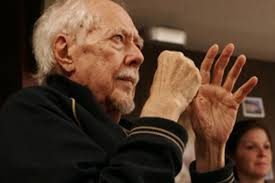
Erich von Stroheim in blackface
Tempête
Possibly last movie acquisition of the year, while I still wait for the 4K/UHD disc of Goodfellas from Oz ($A21 folks includes a regular Blu-ray), the Kino Lorber The Lodger and a couple of other things:
Saturday, 31 December 2022
On the web somewhere - David Hare unearths TEMPETE (Dominique Bernard-Deschamps, France, 1939)
Thursday, 29 December 2022
THINGS IN THE MEMORY FROM 2022
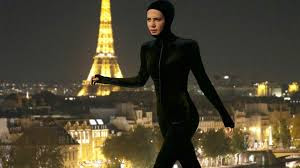 |
| Irma Vep (Olivier Assayas) |
(All lists in alphabetical order)
 |
| The Stranger (Thomas M Wright) |
Best New Films…..…good stories…
Armageddon Time (James Gray)
Athena (Romain Gavras)
Broker (Hirokazu Koreeda)
Here Out West (Leah Purcell, Fadia Abboud, Julie Kalceff, Lucy Gaffy, Ana Kokkinos)
Kompromat (Jérôme Salle)
Memoria (Apichatphong Weerasthekeul)
Les Olympiades Paris 13eme (Jacques Audiard)
The Outfit (Graham Moore)
The Quiet Girl (Colm Bairéad)
She Said (Maria Schrader)
The Stranger (Thomas M Wright)
The Whale (Darren Aronofsky)
The Wonder ( Sebastián Lelio)
 |
| A Spy Among Friends |
Best TV
The Australian Wars (Rachel Perkins)
Being the Ricardos (Aaron Sorkin)
Delhi Crime (S2) (Richie Mehta)
Entrapped (Baltasar Kormakur)
Irma Vep (Olivier Assayas)
Mystery Road:Origin (Dylan River + Blake Ayshford, Kodie Bedford, Timothy Lee, Steven McGregor)
The Offer (Michael Tolkin & Albert S Ruddy)
The Old Man (Jonathan E Steinberg & Robert Levine)
A Spy Among Friends (Alexander Cary, Nick Murphy)
Val Lewton: Man in the Shadows (Kent Jones, 2007)
The Watcher (Ryan Murphy & Ian Brennan)
White Lotus (S1 + S2) (Mike White)
 |
| Petrol (Alena Lodkina) |
Australian Films
Ablaze (Alec Morgan)
Aaratika:Rise Up (Larissa Behrendt)
Here Out West (Leah Purcell, Fadia Abboud, Julie Kalceff, Lucy Gaffy, Ana Kokkinos)
Jeffrey Smart (Catherine Hunter)
Petrol (Alena Lodkina)
Senses of Cinema (John Hughes & Tom Zubrycki)
The Stranger (Thomas M Wright)
Old films not previously seen
Barabbas (Louis Feuillade)
Bedlam (Mark Robson)
Love and Duty (Richard Po)
Lydia Bailey (Jean Negulesco)
Pattes Blanches (Jean Gremillon)
Salo (Pier Paolo Pasolini)
Monday, 26 December 2022
WARNER BROS TURNS 100 IN 2023 - David Hare welcomes some new Blu-ray editions especially MILDRED PIERCE (Michael Curtiz, USA, 1945)
 |
| Jack Carson, Joan Crawford, Mildred Pierce |
2023 marks the 100th anniversary of Warner Bros.
And that event brings a massive flush of new 4K re-scan restorations throughout the year, among them Rio Bravo, North by Northwest and - hopefully The Searchers with color restored to original values.
Sunday, 25 December 2022
LISTS - AN END OF 2022 SHORT CONTEMPLATION
So…where to start. A big year for lists and leading the way is the decennial Sight&Sound Poll of the now up to 100 greatest films ever made. And for extra added value the list compiled from the contributions of the world's great film directors
Sight&Sound has also taken to putting out an annual list of the Best fifty films of the year. In 2021 the only Australian film to make it was James Vaughan’s Friends and Strangers.
In 2022 there are two films. David Esteal’s The Plains comes in at #25 and Baz Luhrman’s Elvis comes in at #17. Two of the 93 critics polled, Neil Young and Guy Lodge, included both Australian films in their top ten.
93 critics voted in the poll and not all were the usual suspects. I wont go in to whom I noted were missing. All up some 328 films were nominated by those 93 and the only thing I can say is maybe I need to get out more…or…maybe the explosion in world-wide production to dizzying levels largely accompanied by a similar explosion in exhibition via a multitude of platforms just makes it impossible. So of the 328 I saw exactly 33 including just last night Adrian Lyne’s adaptation of Patricia Highsmith’s Deep Water which got a single vote from Brad Stevens. As Highsmith adaptations go it’s not a bad effort and captures the Highsmithian trope of what Graham Greene called “the effect of guilt on her characters’. (I hope I have that right.)
Some of those I have missed or maybe have yet to see included more than a couple of handfuls that I could have seen at the local Ritz and there may have been even more at the Sydney Film Festival and, less likely, the myriad of other festivals, film weeks, special screenings and outputs on streaming services big, small, broad and specialist. Somebody may still keep lists of everything that passes by somewhere but doubtful if they can be completely accurate.
And as I started to write this my attention was drawn to the trade journal Variety announcing that it too had assembled a poll of the hundred greatest films ever made. Variety polled thirty two of its contributors, presumably all of whom would also have been invited to participate in the Sight&Sound poll.
 |
| Elvis (Baz Luhrmann) |
This is rather different to the BFI’s list. It has Baz Luhrmann’s Moulin Rouge at #60. George Miiler’s The Road Warrior (that is Mad Max 2) at #54, Jane Campion’sThe Piano at #48. And just as the S&S poll had a surprise winner so does the Variety poll, among many surprises. Here if you are interested. Maybe the Variety list is simply a product mostly from the magazine's American-centric box office obsessed mindset but odd indeed that it should decide to insert itself into the space currently overwhelmingly occupied, very fleetingly, once a decade by the Sight&Sound poll.
One early judgement from a friend on The Variety poll “Nothing from Eastern Europe, nothing from Germany and no mention of The Third Man”. Still at least it didn’t find a place for When Harry Met Sally.
 |
| Mad Max 2, aka The Road Warrior |
One feature of the Variety poll is that it indicates where you can find the film on a streaming platform. A huge percentage of the 100 feature on HBO Max and if I had a devout wish for 2023 it would be that HBO abandon its relationship with the evil Murdoch Foxtel and start up its own streaming service here...and of course bring us all the films that it screens in the US...
Friday, 23 December 2022
"You Like What You Like”: Part Five of Tom Ryan’s 2003 interview with Christopher Guest, Michael McKean and Harry Shearer-
Editor's Note: This is the fifth and concluding part of a transcript of an afternoon spent by Melbourne's then Sunday Age film critic Tom Ryan and a trio of American funsters Christopher Guest, Harry Shearer and Michael McKean who were in town to promote their latest movie A Mighty Wind way back in 2003. If you wish to read Part One CLICK HERE For Part Two CLICK HERE. For Part Three CLICK HERE. For Part Four CLICK HERE
**************************
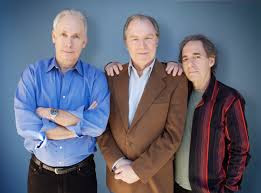 |
| Christopher Guest, Michael McKean, Harry Shearer |
What about the rest of you. Do you read your crits? Are you interested in that kind of public response?
MMcK: No. I tell you…
HS: Well, public response is different. I get e-mails from the public all the time and I read those, but I stopped reading entertainment news a while back – the trade and the entertainment news in Los Angeles – basically because I realised after way too long thinking about my own reactions that it’s all part of an envy machine. You read the stuff and you go, ‘Oh, he’s doing that. Oh, shit.’ Or ‘He’s doing that. Oh goddamn it.’
HS: I said this on the panel the other night to this actor who was on there. There was this press note that said that she reads all her reviews. Above and beyond everything else – I know, because it’s about me and I think about a lot of other people in the business – people can say nice stuff about you or praise you and it goes in one ear and out the other. But I think if they say something nasty about you, there’s this part of your brain that plays it over and over again. It tortures you.
CG: Yeah. Actors are people too, but they’re hypersensitive, obviously, to ‘Why are we standing up there and performing?’ But I think it’s harmful. I really do.
MMcK: I don’t read the reviews either. But Annette reads Vanity Fair.
HS: Oh, no. Now that’s going to be the title of Tom's article. ‘Annette O’Toole Reads Vanity Fair’. Shock! Horror!

Michael McKean, Annette O'Toole
But isn’t there a chance that you could actually learn something from a critic, get some insight?
HS: To what? The movie’s done.
MMcK: You can get some insight into the critic’s taste.
CG: I mean, look, I do what I do. I do what I do. There are a lot of smart people out there. There are some very good writers. It just seems to me… I don’t want to pick and choose. That spoils the whole thing…
HS: And the idea that somebody like Chris lives in the hermetic universe where he’s only surrounded by ‘yes’ men and so critics are the only reality that penetrate this universe is just so wrong. Bob Leighton, his editor, whom he works with on a continuing basis for eight months during the editing of these movies, is a wonderfully perceptive and smart guy.
CG: And I’m the biggest ‘no’ man. I think we’re all extremely critical about what we do and serious about what we do. I’m not surrounded with a… You know, we go on this trip and, because it’s a foreign country, they bring in people to guide us. But I go on trips in the States and I go by myself and people are shocked. ‘Where’s the posse?’
Some people travel with protectors. With me, it’s just me. I call people personally. And they’re shocked. Journalists are shocked. And I say, ‘Oh! Who were you expecting? That I would have my assistant call and then...’ I don’t live in that world…. That’s my choice. It doesn’t work for everybody, but it’s what I do.
Michael, what do you think about this?
MMcK: You know, I guess I agree in theory. But, you know, I find myself reading stuff. I think what I have learned over the last 30 years or so is that none of it matters. If the good doesn’t matter, then the bad doesn’t matter either, in the long run. Because the next thing I do, I’m still working by the seat of my own pants and not according to anybody else’s idea of what my pants are made of, to extend the metaphor.
It really doesn’t matter what anyone says about you because on the day you still have to do the same job. And you’re not using any insights that you gained from your last reviews.
HS: You can’t use… Even the best critic, he’s not there to tell you how to do the next thing. So you’re still back down to your own instincts.
MMcK: I was in a movie called Short Circuit 2 [1988] and I will never forget the scene with the robot….
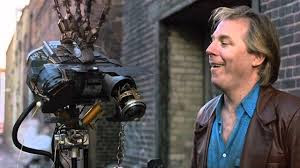 |
| Robot, Michael McKean, Short Circuit 2 |
HS: I swear to God I thought he was human.
MMcK [laughing]: You know, for the movie I spent three months of my life in Toronto and I had some fun and became friends with some people up there, and with a robot…
HS: Hahaha
MMcK: Friends! And I did have a nice time and the movie came out and it was OK – the sequel to a movie that I didn’t even see – and I didn’t know how successful it was…
HS: You should read the reviews of the first one.
MMcK: Hahaha.
HS: Pretty damn good.
MMcK: But I was in Hartford, Connecticut, or I was in New London, Connecticut, and I read a really bad review in The Hartford Courant. Or maybe it was The New London Day. And it said, ‘Michael McKean, whose career has been more lost than found since Laverne and Shirley...’
HS: Oh!
MMcK: And I’m reading this thing and I’m going, ‘Well, chances are, the guy who works for The New London Day wants to work for The Hartford Courant, but he really will never have any insight into my life one way or another.’ But by reading this, I’ve made him have some kind of impact…
HS: It’s giving these people power.
MMcK: That was an interesting lesson for me. That was sort of like, ‘I’m feeling bad right now,’ but that was his only impact.
HS: The question boils down to: whom do you want to give power over your life to?
MMcK: Yeah.
Over your lifetime, have you seen a change in the way the media has covered the kind of things that you do?
MMcK: I dunno.
CG: Well, the last time I read a review was 1988.
Really?
CG: Yeah.
HS: I can’t see any trend.
CG: So I’m not the best one to comment on that. What I do see from being interviewed is the idea that we were interviewed for Best in Show, and we did, in one day, 70 television interviews, and a third of them were from Internet people.
I had no idea who they were but they walked in out of nowhere, and had no idea of what they were talking about, but because they were on the Internet they were given some kind of credential. I don’t know what they do, because I’ve never seen it or heard it. This isn’t someone apprenticing or working for a paper and becoming a drama critic. This is, ‘I’m gonna now just show up and interview you.’ And they don’t know what to ask and they don’t know anything. No reference points to the business or anything. Just complete stupidity. That is bad.
My sense is that the media has changed, that it’s gone from being observational to having always to be sensational in the way stuff gets published.
CG: Yeah?
And as a result people like you suffer…
HS: Well, the artist always suffers. That’s the thing. This is the commonality in my response to all your questions because, whether it’s in regard to the mainstream of the business or to the critics or to the media in general, your job is to maintain contact with the part of you inside that got you into this in the first place, that made you think, ‘I can be funny. Here’s what I think is funny. This is my plan for what’s funny.’
And all these other things are trying to push you off that course. They’re trying to push you either to some consensus place or to some other place, some fashion place… All that is not helpful. The only helpful thing is to try to be better at what you, do to get your chops better, to learn more about your craft. None of this helps you to do that.
MMcK: And I think most journalists are taking their responses and their opinions and transmitting them to people who know even less than they do.
HS [to me]: Don’t take this personally. This isn’t about you.
MMcK: No, no, no, no. But at its very lowest, it’s that kind of Entertainment Tonight thing, watching what you’re doing. You know, ‘Billy Bob and Angelina are getting back together again.’
HS: And who really gives a fuck?
MMcK: And if that’s the end result, then who cares? It has nothing to do with anything either of them do. I think to varying degrees, they’re both talented people…
HS: Oh, but he ruined her life.
MMcK: You’ve had a ‘Billy Bob’ tattooed on your ass? Come on.
HS: Well, it didn’t do much for me.
CG: Ah. That huge white thing on your lip.
What about when something like The Simpsons finishes up on a university course?
HS: Yeah! Oh, that’s alright. But it would make George’s parents mad, I would think. ‘I’m paying that for you to study The Simpsons?’ George is just like my godson.
I guess it’s his revenge. But there must be something about the response that (a) takes it seriously or that (b) is totally obsessed with it, that you have to find really satisfying.
HS: Well, look. I can clearly remember the stuff that I was obsessed with as a kid. I could not go to sleep without hearing Bob and Ray who were this wonderful American comedy team [Bob Elliott (1923–2016) and Ray Goulding (1922–1990)]. So because of that I have some respect for people like that. They’ll grow out of it. We all grow out of it.
MMcK: Would you like to hear some Tom Lehrer songs now?
HS: So, you know, it’s fine. I’m glad they like it. I’m glad they watch it. I wish they were getting a share of the profit.
MMcK: What about this guy who’s doing MacHomer?
HS: I know. That’s been dealt with. Not to our satisfaction, but to Fox’s.
Somebody’s doing MacHomer?
MMcK: Yeah. MacBeth with Simpsons characters.
Well, there was MacDuff, wasn’t there? Not MacDuff…
MMcK: MacBird.
HS: But there was also a Dutch beer in this country that they shut down. I think people’s early reactions to stuff… I have a very strong memory of when Michael and I were first doing the comedy group together and people would come up to us and say, ‘You two guys remind us of …,' and they named another group for whom we had nothing but contempt. You two groups are my favourite comedy groups.’
And I kinda had to think about that and realise that, hey, this is what they do for a living and these people are perfectly entitled to like us and something that we don’t like. And that’s OK. They have that right. And I don’t have the right to really judge them for that because all they’re in search of is a laugh and some entertainment.
MMcK: And they happen to be right in that case.
HS: Well, they happen to be right.
MMcK: I remember somebody saying this. ‘I love British humour. Monty Python, Benny Hill.’
HS: Hahaha. That’s a big jump! Wasn’t just a comma there. More like a chasm.
MMcK: But they like to laugh and they both work for them.
CG: Someone I knew quite well said to me, ‘I love that scene in Mighty Wind where Baliban slaps Michael Hitchcock on the head. It reminded me of my favourite Adams Family moment.’
HS: Hahaha. Exactly!
CG: So what’re you gonna do? What am I supposed to say? ‘It’s not allowed.’ You can’t tell people that. That’s what they like.
HS: Because it’s not their job. They’re not supposed to be making the kind of distinctions that we are in the same way that, you know, somebody who plays violin all their lives in a classical orchestra is gonna be much more critical of other performers than I’m going to be. And I’m entitled to like what I like without being subjected to their withering scorn.
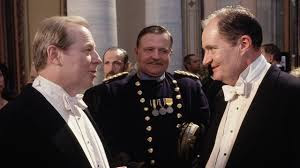 |
| Michael McKean, Pedro Armendariz, Jr. and Jim Broadbent And Starring Pancho Villa as Himself |
MMcK: I met a wonderful guy, an actor, who’s in this Pancho Villa movie I just did… [Bruce Beresford’s And Starring Pancho Villa as Himself (2002)]
HS: That piece o’ shit! Oh, sorry.
MMcK: He’s a wonderful violin player as well. He’s actually a violin player. He’s never been an actor before, but he plays this mood music guy. And I said, ‘Who do you think are the great violin geniuses?’
CG: ‘Besides me?’
MMcK: He said, ‘Itzhak Perlman and Stephane Grappelli.’ There’s no argument. This is a guy who knows the instrument and adores these two very, very different types of artists. And there was no conflict at all. You like what you like.
Tuesday, 20 December 2022
Sixty Years of International Art Cinema - Bruce Hodsdon continues his series - 6 (7) ’New Hollywood’ 3: Robert Altman, “Zeitgeist director of the Seventies”
Despite or because of his maverick status, Altman occupies a central place in the development of American cinema in the bringing together and the synthesis of certain tendencies. He successfully inserted himself into the years of uncertainty following the end of old Hollywood in the face of the rapid growth of the television audience and the failure of big budget (family) entertainments to deliver the required audiences following the false dawn of The Sound of Music (1966).
It has been noted elsewhere that critics and scholars writing on Altman faced the particular challenge that his body of work, more than most, resists interpretation and being narrowed down to a single formula or a single set of meanings. It was marked by a consistently open approach to risk taking.
When the dust settled on the turmoil of the late 60s-early 70s something called the New Hollywood began to emerge. The studio moguls and the Fordist production line division of labour had gone and multinational corporations were taking over the business, authority in the main being shared between what Coppola referred to as “people who had no right to be running the studios” which survived only in name. By right Coppola believed it was the creators of the art, the auteur directors, who should be in control and he was already working on a strategy to realise this.
Success at the box office 1972-5 (see the entry on Coppola in this series) looked as though what David Cook terms the “Auteurs Manqué and Maudit” might prevail. Mediating aesthetically and culturally between the generations were Penn, Kubrick, Peckinpah and Altman who, all except Kubrick, received their basic training in television. The other auteur strand was the “film school” generation of Coppola, Lucas, Scorsese, Spielberg, and De Palma who as a group were “attempting to parlay the creative freedom of the late sixties and early 1970s into auteurist careers.” While attempting to do this collectively, the two groups produced a number of remarkable path-breaking films, some crucially meeting unprecedented box office success.
They also shared with the French ‘nouvelle vague’ directors a sense that this was “their time in history” and the belief that only talent and will was needed for success (Cook 98)
In between was what Cook refers to as the Easy Rider “youth cult” bubble given body by the rapidly expanding 16-30 audience demographic, encouraging the employment of relatively untested directors such as Mike Nichols, Peter Bogdanovich, William Friedkin, Bob Rafelson, Hal Ashby, and Alan Pakula. It was an environment in which originals like John Cassavetes and Terrence Malick also had an opportunity to prosper (ibid 99).
 |
| Lily Tomlin, Keith Carradine, Nashville |
In surveying the seventies, Richard Corliss in ‘Film Comment’ (16/1 1980) noted that “if a Zeitgeist director is a person who expresses the best and the most of his time, then Altman is the director of the Seventies as surely as Jean-Luc Godard was the director of the Sixties. Whereas Godard gives lectures, Altman throws parties. Most of his movies don’t need to be solved, but to be experienced. His radicalism is sneaky; he’s a social critic, not a political dogmatist (though sometimes, as in Nashville and A Wedding, he is a social dogmatist)…. He makes his viewers discover what’s important by themselves - gives them hats, horns, and a sense of participation. He treats his actors in the same way, making them co-conspirators in the creative process… The one similarity between them,” Corliss concludes, “is that they both worked their butts off (Godard sixteen films in the Sixties, Altman fourteen in the Seventies.”
Kubrick in his ‘one-offs’, took control of the (modernist) artist’s prerogative to activate ambiguity leaving ‘excessive’ scope for the viewer/reader’s imagination.
 |
| A Wedding |
This he did by extended contemplation requiring multiple retakes notoriously as much as 40-50 times in order to ‘decide what he wanted,’ Rosenbaum suggests (see Part 6 (4) on Kubrick). Kubrick and Altman both developed the use of the zoom lens during the 1970s. Cook comments that Altman’s use was “essentially non-demonstrative, sometime even subliminal, approximating the mental processes of the viewer…refocussing on significant details in a seemingly arbitrary field…ideally suited to his sense of American social reality as both ambiguous and random” (363). In comparison Kubrick’s resort to the zoom was ‘more restrained and magisterial’ but no less decisive in terms of aesthetic design. His DP on Barry Lyndon, John Allcott, told Michel Ciment that Kubrick “used the zoom integrally throughout and not simply to speed-up production…Each time, it became an image in itself, and not , as is usually the case, [for] moving from one point to the other.”
*************************
Previous entries in this series can be found if you click the following links
Notes on canons, methods, national cinemas and more
Part Two - Defining Art Cinema
Part Three - From Classicism to Modernism
Part Four - Authorship and Narrative
Part Six (1) - The Sixties, the United States and Orson Welles
Part Six (2) - Hitchcock, Romero and Art Horror
Part Six (3) - New York Film-makers - Elia Kazan & Shirley Clarke
Part Six (4) - New York Film-makers - Stanley Kubrick Creator of Forms
Part Six (5) ‘New Hollywood’ (1) - Arthur Penn, Warren Beatty, Pauline Kael and BONNIE AND CLYDE
Part Six (6) Francis Ford Coppola: Standing at the crossroads of art and industry




